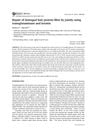 October 2024 in “Cosmoderma”
October 2024 in “Cosmoderma” Proper hair care and suitable products are essential for men's scalp health and well-being.
 May 2024 in “Journal of cosmetic dermatology”
May 2024 in “Journal of cosmetic dermatology” Heat-treated Limosilactobacillus fermentum with menthol, salicylic acid, and panthenol promotes hair growth and balances scalp microbiome in people with androgenetic alopecia.
Whale oil significantly promotes hair growth and may be a safe, effective alternative to minoxidil.
 January 2020 in “Journal of dermatology research and therapy”
January 2020 in “Journal of dermatology research and therapy” Most over-the-counter hair loss treatments lack strong evidence of effectiveness but cost nearly as much as the proven treatment, minoxidil.
182 citations,
November 2018 in “Cosmetics” Seaweeds have beneficial compounds for skin care, including anti-aging and protective effects.
 80 citations,
April 2006 in “Clinical Interventions in Aging”
80 citations,
April 2006 in “Clinical Interventions in Aging” Minoxidil and Finasteride are effective for male baldness; more research is needed for hair aging treatments.
67 citations,
May 2016 in “Journal of Cosmetic Dermatology” Peptides, proteins, and growth factors in skincare show promise for improving skin health.
53 citations,
July 2016 in “Cosmetics” Future hair cosmetics will be safer and more effective.
51 citations,
January 2014 in “International journal of trichology” Shampoo pH can affect hair health, with alkaline shampoos potentially causing damage and acidic shampoos reducing frizz.
37 citations,
October 2015 in “PeerJ” Perming significantly changes hair's molecular structure, while shampoo and conditioner do not.
25 citations,
May 2019 in “Cosmetics” 18-MEA and cationic surfactants can restore and maintain hair's hydrophobic nature, improving its beauty and feel.
17 citations,
November 2021 in “Journal of Cosmetic Dermatology” Combination therapies for androgenetic alopecia work best but can have significant side effects and costs.
8 citations,
January 2020 in “PeerJ” Alopecia Areata causes significant structural and compositional changes in hair.
 7 citations,
December 2021 in “Pharmaceutics”
7 citations,
December 2021 in “Pharmaceutics” Natural products like plant extracts can help promote hair growth and could be used to treat hair loss.
 5 citations,
February 2022 in “Acta Biomaterialia”
5 citations,
February 2022 in “Acta Biomaterialia” Nanomaterials can improve hair care products and treatments, including hair loss and alopecia, by enhancing stability and safety, and allowing controlled release of compounds, but their safety in cosmetics needs more understanding.
 3 citations,
February 2023 in “ACS omega”
3 citations,
February 2023 in “ACS omega” Grape seed oil improved hair quality the most, followed by rosehip and safflower seed oils, and reduced damage from shampoo.
1 citations,
November 2022 in “Molecules/Molecules online/Molecules annual” Low-molecular weight hyaluronate can make damaged hair stronger.
1 citations,
May 2022 in “International Journal of Trichology” Hair camouflage techniques can help manage hair loss and boost confidence.
 October 2024 in “Cosmetics”
October 2024 in “Cosmetics” Afro-textured hair needs personalized care due to its unique genetic traits.
 February 2023 in “Molecules”
February 2023 in “Molecules” Cactus extract from Notocactus ottonis may help promote hair growth.
 January 2017 in “Journal of Investigative Dermatology Symposium Proceedings”
January 2017 in “Journal of Investigative Dermatology Symposium Proceedings” The 2015 Hair Research Congress concluded that stem cells, maraviroc, and simvastatin could potentially treat Alopecia Areata, topical minoxidil, finasteride, and steroids could treat Frontal Fibrosing Alopecia, and PTGDR2 antagonists could also treat alopecia. They also found that low-level light therapy could help with hair loss, a robotic device could assist in hair extraction, and nutrition could aid hair growth. They suggested that Alopecia Areata is an inflammatory disorder, not a single disease, indicating a need for personalized treatments.
January 2023 in “International Journal of Trichology” The hemp extract significantly increased hair regrowth in both men and women without any side effects.
 3 citations,
December 2018 in “PubMed”
3 citations,
December 2018 in “PubMed” Most over-the-counter hair loss treatments lack strong evidence of effectiveness and are not FDA-approved.
October 2015 in “Cosmetic Dermatology” Hair is complex, varies in type, and plays a big role in attractiveness and culture.
February 2022 in “Cosmetic Dermatology” Different hair care methods affect hair health and appearance, and there are many ways to camouflage hair loss.
 3 citations,
January 2021 in “ScienceAsia”
3 citations,
January 2021 in “ScienceAsia” Using an enzyme and keratin treatment can significantly repair and strengthen damaged hair.
 22 citations,
January 2015 in “Dermatology Research and Practice”
22 citations,
January 2015 in “Dermatology Research and Practice” An extra-strength marine protein supplement helped increase hair growth and decrease hair shedding in women with thinning hair.
 13 citations,
March 2019 in “Journal of cosmetic dermatology”
13 citations,
March 2019 in “Journal of cosmetic dermatology” Heat damages hair, with Asian hair losing more protein than Caucasian hair.
4 citations,
October 2018 in “Skin appendage disorders” Co-washing is gentler on hair but can cause residue buildup.
27 citations,
January 2015 in “International Journal of Trichology” The supplement helps improve hair growth and reduce hair shedding.














